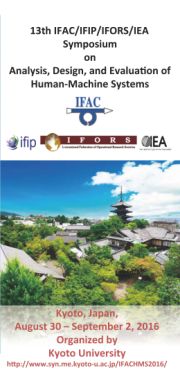Technical Program
Plenary Talks
Toyota’s Research into the Interaction between Automated Driving and Humans
~ The Mobility Teammate Concept ~
Thursday September 1, 2016, 10:50-11:50

Mr. Hiroaki Okuchi
Managing Officer
Toyota Motor Corporation
Recently, automated driving with AI has been in the spotlight. Toyota Motor Corporation (Toyota) has developed automated driving technology since the 1990s, and thinks that the coordination between the vehicle and the human is essential. In this context, Toyota announced the Mobility Teammate Concept last October. It represents Toyota’s development goal that “In order to have all people move freely, smoothly and safely, driver and vehicle should share the same goal and build a partnership by supporting each other.” …
Being safe in an unsafe world – The practical side of resilience engineering
Thursday, September 1, 2016, 13:00-14:00

Prof. Erik Hollnagel
University of Southern Denmark
Safety is usually defined as a condition where as few things as possible go wrong. Safety efforts therefore focus on the identification and reduction of risk and harm and safety is measured by the number of cases where something has failed, resulting in accidents and incidents. This traditional definition of safety has been called Safety-I. The main shortcoming is that the management of safety is based on evidence from random snapshots of failed system states. Resilience engineering argues that safety should be viewed from a different perspective, with emphasis on things that go well. According to this definition, called Safety-II, a system is safe if as much as possible goes well. Safety management and the understanding of safety must therefore be based on a systematic understanding of how performance succeeds, rather than on how it fails. The purpose of safety efforts is similarly to ensure that things go well rather than to prevent them from going badly. …
Making the real-world accessible
Friday, September 2, 2016, 13:30-14:30
Dr. Chieko Asakawa
IBM Fellow
IBM Research - Tokyo
Can you imagine how visually impaired people like me manage ourselves in the real world? Can you imagine how we interact with others, how we move around unfamiliar places, and how we recognize things surrounding us? There are so many challenges to live in society without vision. We call this the real-world accessibility challenge. Now, combinations of sensors and cognitive computing technologies are offering new ways for the blind to more meaningfully interact with the world, and realize a Cognitive Assistant for real-world accessibility. Our Cognitive Assistant will augment the missing or weakened abilities of people with disabilities by helping them interact, navigate, and understand the surrounding world through the power of cognitive computing. …
Special Workshop
Lessons Concerning Resilience of Socio-Technical Systems Learned from Experiences During the Great East Japan Earthquake
Wednesday, August 31, 2016, 16:30-18:00
| Speaker: | Prof. Masaharu Kitamura | Research Institute for Technology Management Strategy / Emeritus Professor at Tohoku University |
|---|---|---|
| Mr. Atsufumi Yoshizawa | Former Unit 5&6 Superintendent, Fukushima Daiichi Nuclear Power Station Tokyo Electric Power Company | |
| Ms. Kyoko Oba | Japan Atomic Energy Agency | |
| Facilitator: | Prof. Tetsuo Sawaragi | Kyoto University |
The Great East Japan Earthquake of March 11, 2011 and the nuclear disaster at Fukushima Daiichi Nuclear Power Station (NPS) clearly demonstrated the brittleness of many socio-technical systems in Japan. As a result, there were innumerable accidents and disasters in various industries and regions. Accident investigations were launched to identify failures and inefficient handling responsible for the accidents and disasters, as it is considered that similar accidents or disasters can be prevented by removing the causes of failures and inefficient handling. However, it is not clear whether such a find-and-fix approach is sufficient. This Workshop will pursue answers to this question. …
List of Speeches/Presentations
- A. Yoshizawa et al.; Lessons Learned from Good Practices During the Accident at Fukushima Daiichi Nuclear Power Station in Light of Resilience Engineering
- K. Oba et al.; Socially Constructed Resilience by Multiple Organizations- The Case of Tokai No2 Power Station-
- M. Kitamura; Supplementary Remarks on Lessons Learned from the Great East Japan Earthquake
Technical Tour
IFAC HMS 2016 is pleased to organize a technical tour to the attractive two spots below. Separate registration and registration fee payment from the symposium is necessary for the tour and the registration is handled through the symposium registration system. The maximum size of group is limited and participation is on a first-come, first-served basis.
| Date | Saturday, September 3, 2016, 9:00am-4:00pm |
|---|---|
| Price | JPY 5,000 |
| Number of participants | 25 (limited) |
Places to visit in the tour:
- Omron Corporation Keihanna Innovation Center
- The Kyoto Railway Museum
Session Schedule
The full symposium program is available at PaperCept.
Program Updates <09/Jun/2016>
The following modifications were made.
Human Factors for Highly Automated Transport Systems + Social Computing (Thurs 14:20-17:45)
Moved to:
Human Factors for Highly Automated Transport Systems (Wed YSAKA 14:45-16:25)
Social Computing (Wed YSAKA 13:00-14:30)
Training Effectiveness 1 & 2 (Wed YSAKA 13:00-14:30) & (Wed YSAKA 14:45-16:15)
Moved to:
Training Effectiveness 1 & 2 (Thu PAGODA 14:20-16:00) & (Thu PAGODA 16:15-17:45)
Information for Presenters
- Each presentation room will be equipped with a laptop computer and a projector, connected with a VGA cable, for PowerPoint presentations. Software available on laptops are in Japanese language. Symposium staff are pleased to help you operate the computer as well as other equipment.
- Speakers are kindly requested to come to the session room 10min. at the latest prior to the starting time. They should inform the session chair and test that their computer works with the projector in the room.

